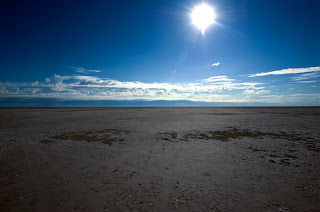A Just Transition And Climate Change
A just transition is a broad concept that encompasses the shift of the world from climate harming and environmentally polluting practices to ways that are good for the environment while being socially fair and just, and promoting economic prosperity.
It is basically pegged on sustainable
development – social equity, environmentally healthy and economically viable.
The shift towards green economies will
affect the world economically and basically sectors and people who have relied
on fossil fuels for decades to earn a livelihood and for economic development.
Therefore this transition needs to be just
– to take into account the rights of workers and to be carried out in such a
way that economies are able to adjust accordingly without taking too much of a hit.
This includes also social dialogue which is
holding consultative forums with ordinary citizens and frontline communities on
climate positive development and explaining the benefits of abandoning the use
of fossil fuels in favor of climate safe renewable energy and other strategies.
People’s opinions and concerns must be
taken into account. This is the case especially for mitigation and adaptation
projects. Some mitigation projects may affect the rights of local communities
and indigenous peoples who live with, co-exist with and safeguard nature. They
rely on natural resources for cultural, spiritual and economic purposes.
So, strategies such as completely removing
them from indigenous lands (e.g. forests) or denying them access to the same
can be received negatively by such communities since that has been their home
for centuries. Such may be in an effort to protect forests from destruction and
encroachment and safeguard their carbon sequestration roles.
 |
| Nature - Image Iwaria/Tomas Forgac |
Though well meaning, this can disadvantage
such groups and the right way is to share the financial proceeds of
environmental conservation with local communities so that they can see the
benefits from an economic perspective, and also serve as an alternative way of
earning livelihoods.
Also educating and sensitizing them on how
to take care of the environment while benefitting likewise is appropriate.
Big hydropower
and solar projects also take up community land and inconvenience locals. A
solution might be to employ more of the local populace in constructing and running
of such plants, while also providing this clean power at a discounted rate.
Another thing is to build social amenities such as schools, hospitals and roads
for the community.
Not only so, but
in areas where displacements will occur in order to make room for such
projects, people must be resettled in good areas and fairly compensated for
their losses.
All this spurs
economic growth and creates social goodwill.
Fossil fuels and woodfuel have been a
source of cheap though climate polluting energy especially for poor or rural
communities. But the shift to renewable energy may disadvantage these people
because of lack of access to such clean energy and it being expensive. This
might contribute to energy poverty. Carbon taxes when not well handled can cause
energy to be more expensive which hits the poorest hardest.
Therefore, a just transition will first
look at creating awareness in such groups concerning the effects of fossil
fuels on the environment and climate, while also providing clean and accessible
energy to them.
Another aspect of just transition is to
respect the rights of communities to their lands. Fossil fuel and big
infrastructure projects can infringe on community lands which are important
e.g. sacred sites or burial sites. It is important to respect the people’s
rights in such case.
Fossil fuel pipelines have been known to
disrespect such concerns and thus cause friction and conflict with such
communities.
This is also the case in especially
biodiverse areas and places of vast ecological importance such as game parks,
watersheds and other protected areas.
Sensitive areas housing rare species of
wildlife, water sources such as forests and national reserves may suffer
irreparable harm from infrastructure projects such as pipelines, railway lines
or roads cutting through them.
All wildlife has an inherent right to exist
and does not exist solely at the pleasure of man or for exploitation purposes.
For years, environmentally harmful projects
such as incinerators, landfills, dumping sites and fracking sites have been
situated in low income neighborhoods, near poor communities or where people of color
live. This has resulted to cancer, respiratory and reproductive diseases and
polluted water and air. This lowers the quality of life and lifespan for these
people. It is therefore blatant disregard for the rights of these people to
life and a clean environment.
This is also the case for coal miners who
end up suffering from black lung disease. A just transition respects the right
to energy but also the rights of people such as to good health and a clean
environment.
In terms of environmental justice, climate
action is arguably healthy for the planet and people.
When it comes to employment and jobs,
transitioning from fossil fuels to clean energy will result to a loss of 6
million jobs but renewables are projected to create about 18 million jobs.
Therefore, the ones losing their jobs
should be retrained and absorbed into these new jobs. They will need jobs with
similar remuneration or higher perks.
Climate action should be people oriented.
It should be bottom-up not just top-down. Grassroots communities must have a
say in climate affairs and projects. Consensus is very important for climate
action to be successful at the bottom of the pyramid. People must feel
included, and not just told what to do.
Creation of awareness and climate education
is thus necessary in order to ensure that a large majority of the citizenry
understand climate change and all its different facets while embracing climate
action.
An informed population will drive social
and political change, because they will even vote in the right leaders.
The principle of common but differentiated
responsibility says that we all have a responsibility to mother Earth and
especially to climate. We have a responsibility to protect that Earth rather
than overexploit and damage it for our benefit.
In terms of climate change, everyone and
every nation in the globe has to cut emissions and embrace adaptation while
minimizing and averting loss and damage. But the levels of responsibility
differs. Historically and currently, the highest emitters of greenhouse gases
are western nations and the G20 in particular. 75% of emissions come from this
countries – just a handful – though the wealthiest.
The effects however are felt by majority of
the world who are arguably innocent of causing climate change - small island
states (big ocean states), African states and ecosystems and wildlife. The effects
of climate change including droughts, wildfires, storms and the like cause
massive economic damage and loss of life which is costly. Climate justice
therefore rightfully demands that these nations take responsibility and cut
emissions.
Respective capabilities implies that
nations cut emissions as they are able to. Turning economies to a green trajectory
might be relatively costly because it need tons of financial resources to
invest into green energy and turn systems of production and the entire economy
green. This can be achieved through abandoning fossil fuels and using those
resources to invest in clean energy.
However, not all nations have such
capacity. For developing nations, the priority is first on economic development
though this can be done in a green manner.
Just transition also touches on future
generations. We have to protect the Earth and its climate for the sake of
future generations and not just for ourselves. We must be just and fair to the
unborn and young. If we don’t act, they will inherit a planet facing the serious
effects of crossing the 1.5 degrees threshold of warming as laid out in the
Paris Agreement, yet this is none of their fault.
Economically, creating subsidies to incentivize
use of green energy and making manufacture of solar panels/small hydro cheaper
by removing taxes can promote uptake of clean energy and encourage especially
rural communities to be independent of mains electricity and use off grid solar
energy.
Making solar power storage batteries widely
available is also a good idea.
Public procurement can be used to
incentivize environmentally sound businesses. Having requirements in tendering
processes that promote environmental sustainability will encourage green
businesses and shift the business sector towards being conscious of the
environmental impact of their activities.
Public money e.g. in budgets can be used to
build green infrastructure, climate proof existing infrastructure or put into
climate mitigation by planting forests or restoring wetlands.
Also, it would be advisable to encourage
use of green technologies by encouraging innovation especially in factories, schools
and other centers of learning.
Speaking of this, teaching about the
environment and sensitizing the youth from an early age and in learning
institutions will cause them to grow up with a keen sense of environmental
awareness. This is important because it will result to a society that
recognizes the inherent and central value of the environment. The young are the
future politicians, business people, homemakers, parents, workers, teachers,
opinion shapers, engineers and other professionals.
Governments can also require or provide
green certification e.g. for agricultural extension officers trained in crop
production that is organic and sustainable, or for renewable energy practitioners.
Green certification standards can be used
to ensure organizations and institutions are safe for the environment and
discourage climate harming activities.
Research into the impact of climate
policies and subsequent correction or elevation can be used to foster a just
transition.
Likewise, just transition efforts must be
included in climate plans (nationally determined contributions), adaptation
plans as well as including them in all development plans.
Co-operation especially in sharing and
transferring of technical expertise internationally, regionally and locally is
important. This is also between scientific institutions and businesses, enterprise
owners and farmers in order to train them on the best ways to undertake climate
action without losing jobs or compromising economic productivity.
Incorporation of traditional and indigenous
knowledge and respecting the custodians of it will foster goodwill and further
climate action.
We need all hands on deck.
Another important point is to ensure that groups
such as women, youth and disabled people have access to green jobs and economic
opportunities by use of laws and policies. Enforcement of quotas can ensure the
equal participation of these groups and hence promote a just transition and
fairness in climate action. Everyone is included.
At the same time, in order not to
disadvantage workers who have been in the fossil fuel sector for long, special
consideration should be given to them without forms of discrimination such as
ageism. The goal is to ensure that livelihoods are protected by offering them
an alternative means of earning an income which is climate friendly.
A just transition looks at the rights of
everyone, and aims towards transitioning the planet towards a climate safe
pathway that generates economic prosperity while maintaining environmental
integrity and social equity.




Comments
Post a Comment